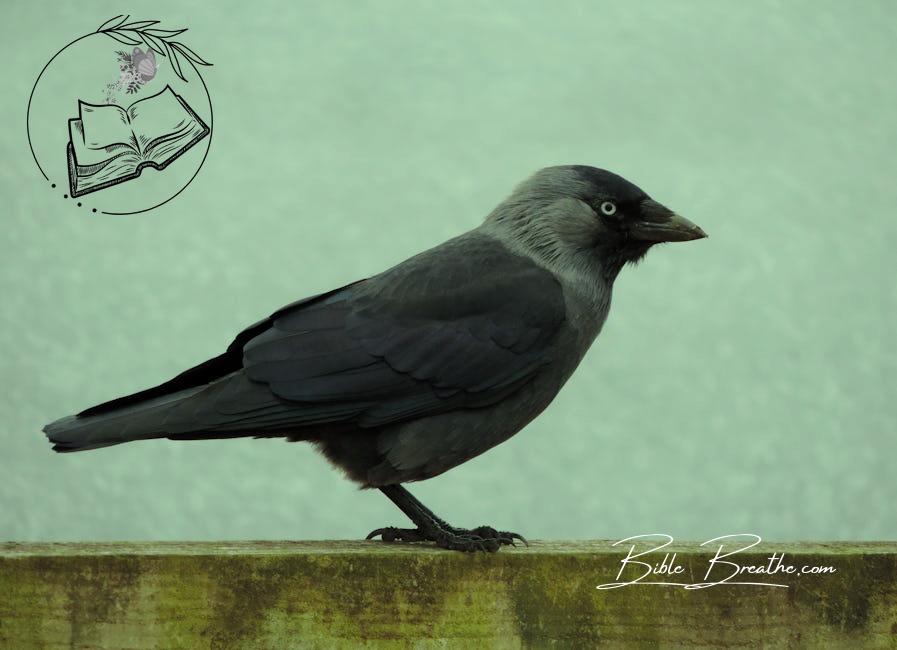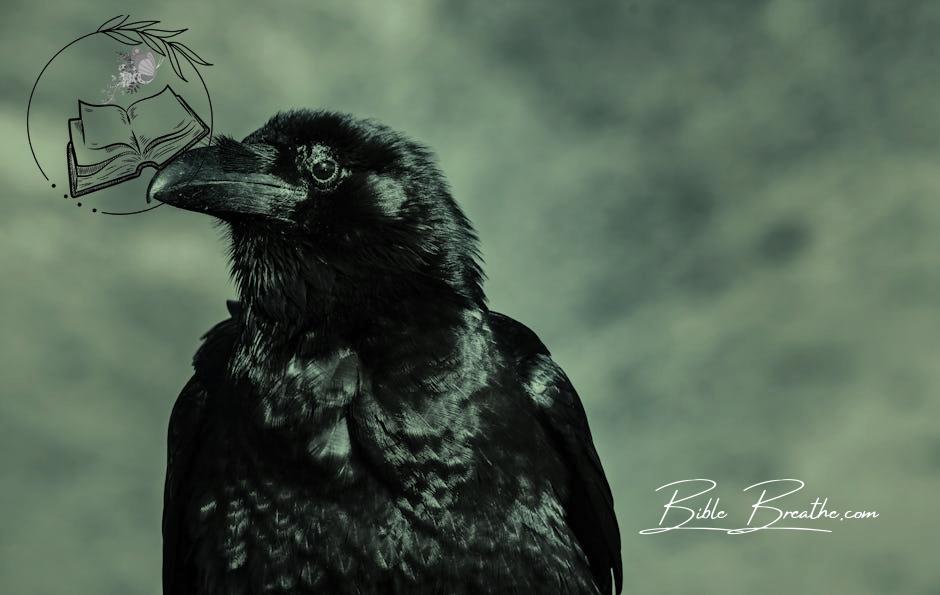Key Takeaways
- In the Bible, God used ravens to feed Elijah, a prophet, when he was hiding from King Ahab in the wilderness (1 Kings 17:4-6).
- Ravens are mentioned as unclean birds in the Bible, which made them an unlikely choice for God to use to feed Elijah (Leviticus 11:13-15, Deuteronomy 14:12-14).
- The use of ravens may have been a test of Elijah’s faith, as he had to trust that God would provide for him even in the most unexpected ways.
- Ravens are also known for their intelligence and problem-solving abilities, which may have made them a fitting choice for God to use in this situation.
- The story of Elijah and the ravens is often seen as a demonstration of God’s power and provision in times of need.
- The use of ravens in this story may have also been a reminder to Elijah and the Israelites of God’s sovereignty over all creation, including the natural world Creation myth.
Introduction
The Raven’s Role in Biblical Stories
When we think of biblical animals, we often think of lions, lambs, or even donkeys. But what about ravens? These mysterious birds have a special place in the Bible, and their significance goes beyond just being a random creature.
Overview of the Article’s Main Points
In this article, we’ll explore why God used ravens in specific biblical stories. We’ll dive into the symbolism behind these birds, their role in God’s plan, and what we can learn from their appearances in the Bible. So, let’s get started!
Biblical Context of Ravens
Photo modified by BibleBreathe.com. Original photo by Anthony 🙂 on Pexels
Overview of the Role of Ravens in the Bible
Ravens might seem like an unusual choice for God to use, but they play a significant role in the Bible.
In fact, ravens are mentioned in several stories, often symbolizing God’s provision and care for His people.
So, what’s the big deal about ravens?
Well, in the ancient world, ravens were seen as ** scavengers**, feeding on carrion and scraps. Not exactly the most glamorous creatures.
But God saw something in them that we can learn from.
Specific Stories Where God Used Ravens
Let’s dive into two famous stories where God used ravens in amazing ways:
- Elijah and the Ravens: During a severe drought, God sent ravens to feed Elijah, providing him with bread and meat twice a day (1 Kings 17:4-6, KJV). Talk about a heavenly food delivery service!
- Noah and the Raven: After the flood, Noah released a raven to check if the floodwaters had receded (Genesis 8:6-7, KJV). The raven’s return signified that the ground was still wet, but it also showed God’s patience and mercy.
In both stories, ravens were used to demonstrate God’s power and provision in unexpected ways.
So, the next time you see a raven, remember that even the most unlikely creatures can be used by God to show His love and care for us.
Symbolism of Ravens in the Bible
Explanation of the Symbolism of Ravens in the Bible
So, why did God use ravens to feed Elijah in the wilderness?
It’s not just a random animal choice – there’s some deep symbolism going on here.
In the Bible, ravens are often associated with death, destruction, and chaos.
They’re scavengers, always on the lookout for their next meal, and they’re not picky about what they eat.
But here’s the thing: God used these birds, often seen as outcasts, to care for His prophet.
It’s a powerful reminder that God can use anyone or anything to accomplish His purposes.
Interpretation of the Symbolism in the Context of the Question
So, what does this mean for us today?
Maybe you’re feeling like Elijah – alone, afraid, and unsure of what’s next.
But here’s the thing: God is still in control, even when things seem darkest.
He can use the most unlikely people or circumstances to bring about His plans.
Just like the ravens brought food to Elijah, God can bring hope, peace, and provision to us in the most unexpected ways.
“Consider the ravens: for they neither sow nor reap; they neither have storehouse nor barn; and God feedeth them: how much more are ye better than the fowls?” (Luke 12:24, KJV)
Why God Chose Ravens
Photo modified by BibleBreathe.com. Original photo by Ellie Burgin on Pexels
Possible Reasons Why God Chose to Use Ravens
So, why did God use ravens to feed Elijah?
It’s not like they were the most obvious choice, right?
I mean, ravens are often associated with death and destruction, not exactly the most comforting creatures.
But maybe that’s exactly why God chose them.
Maybe God wanted to show Elijah (and us) that He can use anything to accomplish His will, even the most unlikely of creatures.
Or maybe God wanted to demonstrate His power and provision in a way that would leave no doubt in Elijah’s mind.
After all, ravens are not exactly known for their kindness or generosity, so if they were willing to bring food to Elijah, it was clearly a miracle.
Analysis of the Significance of God’s Choice
So, what can we take away from God’s choice to use ravens?
Here are a few things:
- God’s ways are not our ways: We might not always understand why God chooses to do things a certain way, but we can trust that His ways are higher than ours.
- God can use anyone or anything: We’re all called to be used by God, no matter how unlikely or unqualified we may feel.
- God provides in unexpected ways: We might not always see how God is going to provide for us, but we can trust that He will, even if it’s through unexpected means.
“Consider the ravens: for they neither sow nor reap; which neither have storehouse nor barn; and God feedeth them: how much more are ye better than the fowls?” (Luke 12:24, KJV)
Historical Context of Ravens
Cultural Significance of Ravens in the Ancient World
Let’s talk about ravens.
In the ancient world, ravens were more than just birds – they were symbols of power, intelligence, and mystery.
In many cultures, ravens were associated with gods and goddesses, like Odin in Norse mythology and Apollo in Greek mythology.
They were seen as messengers of the divine, carrying prayers to the gods and bringing back wisdom to humans.
Comparison with Biblical Use of Ravens
So, why did God use ravens to feed Elijah in the wilderness?
Was it just a random choice, or was there something more to it?
In the biblical context, ravens represented God’s provision and care.
Just like the ravens brought food to Elijah, God was showing him that He was still in control, even in the midst of drought and famine.
| Ancient Culture | Significance of Ravens | Biblical Significance |
|---|---|---|
| Norse mythology | Associated with Odin, god of wisdom | Represented God’s provision and care |
| Greek mythology | Associated with Apollo, god of prophecy | Symbolized God’s sovereignty and power |
By using ravens to feed Elijah, God was showing him that He was still with him, even in the darkest of times. And that’s a message we can still apply to our lives today.
Theological Interpretations of Ravens
Photo modified by BibleBreathe.com. Original photo by Tom Swinnen on Pexels
Overview of Different Theological Interpretations of the Use of Ravens
When we think about God’s use of ravens in the Bible, we might wonder why He chose these specific birds.
Was it just a random choice, or is there something more to it?
Let’s dive into some theological interpretations that might shed some light on this question.
- Provision and Care: One interpretation is that God used ravens to show His provision and care for Elijah. In a time of drought and famine, God sent ravens to bring food to His prophet. This reminds us that God is our Jehovah Jireh, our provider.
- ** Sovereignty and Power: Another interpretation is that God used ravens to demonstrate His sovereignty and power**. Ravens are not typically associated with gentle, caring behavior, yet God used them to care for Elijah. This shows us that God’s power is not limited by our human expectations.
Analysis of the Implications of These Interpretations
So, what do these interpretations mean for us today?
| Interpretation | Implication |
|---|---|
| Provision and Care | God is our provider, and we can trust in His care for us. |
These interpretations remind us that God is a God of surprises and miracles. He can use anything, even ravens, to accomplish His purposes.
As the German theologian, Dietrich Bonhoeffer, once said, “The Lord is not confined to OUR limitations.”
Criticisms and Controversies
Explanation of Criticisms and Controversies Surrounding the Use of Ravens
So, you might be wondering, why did God use ravens to feed Elijah in the wilderness?
It’s a fair question, and one that’s sparked some controversy over the years.
Some critics argue that using ravens, which are often seen as unclean birds, goes against God’s own laws about purity.
Others claim that it’s just plain weird – I mean, why ravens and not, say, doves or eagles?
| Criticism | Concern |
|---|---|
| Unclean birds | Doesn’t God care about purity? |
Analysis of the Impact of These Criticisms on the Interpretation of the Bible
But here’s the thing: these criticisms can actually deepen our understanding of God’s character.
They force us to confront our own biases and assumptions about how God works.
As Frederick Buechner once said, “Faith is hardly faith at all if it is not played out in the details of daily existence.”
By examining these criticisms, we can gain a more nuanced understanding of God’s sovereignty and provision.
So, what do you think? Do these criticisms resonate with you, or do you see them as minor bumps in the road of faith?
Ravens in Modern Christianity
Photo modified by BibleBreathe.com. Original photo by Tim Mossholder on Pexels
The Role of Ravens in Modern Christian Culture
Ravens in the Bible are often seen as mysterious creatures, but what do they mean to us today?
Let’s face it, God using ravens to feed Elijah in the wilderness (1 Kings 17:4-6, KJV) is a pretty weird story.
But, what if I told you that ravens still have a special place in modern Christian culture?
They do! And it’s not just about the quirky bird itself, but what it represents.
| Symbolism | Modern Christian Significance |
|---|---|
| Provision | God’s provision in our lives, even in the toughest times. |
| Mystery | The mysterious ways of God, which often don’t make sense to us. |
Significance of Ravens in Contemporary Theological Debates
So, what’s the big deal about ravens in modern theology?
Well, the raven’s symbolism can actually help us understand some pretty deep theological concepts.
For example, the raven’s provision for Elijah can be seen as a metaphor for God’s sovereignty.
It’s a reminder that, no matter what we’re going through, God’s got this.
“Consider the ravens: for they neither sow nor reap; which neither have storehouse nor barn; and God feedeth them: how much more are ye better than the fowls?” (Luke 12:24, KJV)
In the end, the raven’s role in modern Christianity is a powerful reminder of God’s love and care for us.
Frequently Asked Questions About Why Did God Use Ravens
What is the significance of ravens in different cultures and religions?
Ravens hold significant symbolism across cultures and religions, often representing intelligence, mystery, and transformation. In Norse mythology, Odin’s ravens Huginn and Muninn symbolize wisdom and insight. In many Indigenous cultures, ravens are seen as creators and tricksters, while in Christianity, they’re associated with evil and sin. Their enigmatic nature has captivated human imagination, making them a fascinating and complex symbol.
How do Ravens Communicate with Each Other?
Ravens communicate with each other through a variety of vocalizations, including calls, songs, and rattles. They also use body language, such as posturing and facial expressions, to convey information and express emotions. They have been observed engaging in playful activities, like sliding on snow, to bond and strengthen social bonds.
How do Ravens Communicate with Humans?
Ravens are known to interact with humans in various ways, including mimicking human speech and sounds. They have been observed following humans, especially in areas with food sources, and can even learn to perform tricks for rewards. In some cases, ravens have formed close bonds with humans, allowing for a level of understanding and communication.
What are some interesting facts about ravens and their behavior?
Ravens are incredibly intelligent birds, known for their problem-solving skills and memory. They’re social birds, often living in large communities, and have been observed playing, communicating, and even displaying empathy. They’re also expert thieves, stealing food from other birds and even caching it for later. Talk about clever!





